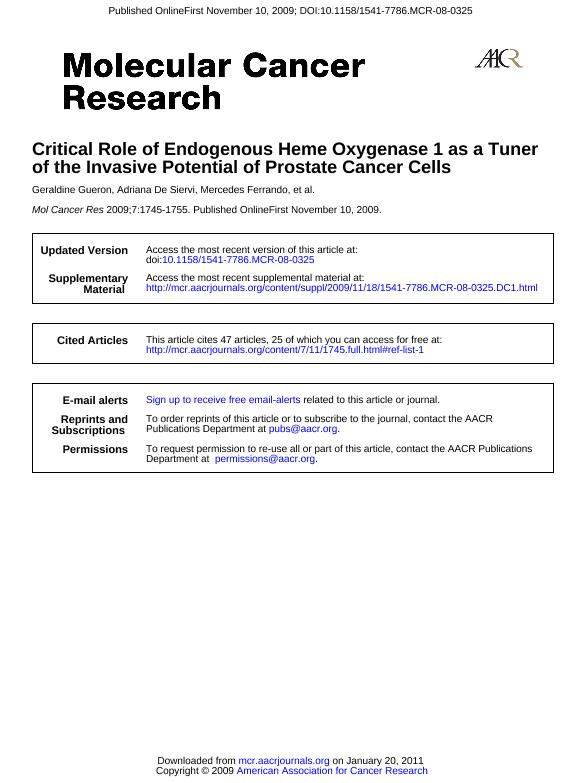Artículo
Critical role of endogenous heme oxygenase 1 as a tuner of the invasive potential of prostate cancer cells
Gueron, Geraldine ; de Siervi, Adriana
; de Siervi, Adriana ; Ferrando, María Mercedes Catalina
; Ferrando, María Mercedes Catalina ; Salierno, Marcelo Javier
; Salierno, Marcelo Javier ; de Luca, Paola
; de Luca, Paola ; Elguero, María Belén
; Elguero, María Belén ; Meiss, Roberto; Navone, Nora; Vazquez, Elba Susana
; Meiss, Roberto; Navone, Nora; Vazquez, Elba Susana
 ; de Siervi, Adriana
; de Siervi, Adriana ; Ferrando, María Mercedes Catalina
; Ferrando, María Mercedes Catalina ; Salierno, Marcelo Javier
; Salierno, Marcelo Javier ; de Luca, Paola
; de Luca, Paola ; Elguero, María Belén
; Elguero, María Belén ; Meiss, Roberto; Navone, Nora; Vazquez, Elba Susana
; Meiss, Roberto; Navone, Nora; Vazquez, Elba Susana
Fecha de publicación:
11/2009
Editorial:
American Association for Cancer Research
Revista:
Molecular Cancer Research
ISSN:
1541-7786
Idioma:
Inglés
Tipo de recurso:
Artículo publicado
Clasificación temática:
Resumen
Prostate cancer (PCa) is the second leading cause of cancer-associated death in men. Inflammation has been recognized as a risk factor for this disease. Heme oxygenase 1 (HO-1), the inducible isoform of the rate-limiting enzyme in heme degradation, counteracts oxidative and inflammatory damage. Here, we investigated the regulated expression of HO-1 and its functional consequences in PCa. We studied the effect of genetic and pharmacologic disruption of HO-1 in the growth, invasion, and migration in androgen-sensitive (MDA PCa2b and LNCaP) and androgen-insensitive (PC3) PCa cell lines. Our results show that HO-1 levels are markedly decreased in PC3 compared with MDA PCa2b and LNCaP. Hemin treatment increased HO-1 at both protein and mRNA levels in all cell lines and decreased cell proliferation and invasion. Furthermore, overexpression of HO-1 in PC3 resulted in markedly reduced cell proliferation and migration. Accordingly, small interfering RNA-mediated silencing of HO-1 expression in MDA PCa2b cells resulted in increased proliferation and invasion. Using reverse transcription-quantitative PCR-generated gene array, a set of inflammatory and angiogenic genes were upregulated or downregulated in response to HO-1 overexpression identifying matrix metalloprotease 9 (MMP9) as a novel downstream target of HO-1. MMP9 production and activity was downregulated by HO-1 overexpression. Furthermore, PC3 cells stably transfected with HO-1 (PC3HO-1) and controls were injected into nu/nu mice for analysis of in vivo tumor xenograft phenotype. Tumor growth and MMP9 expression was significantly reduced in PC3HO-1 tumors compared with control xenografts. Taken together, these results implicate HO-1 in PCa cell migration and proliferation suggesting its potential role as a therapeutic target in clinical settings.
Palabras clave:
HEME OXYGENASE 1
,
PROGRESSION
,
INVASION
,
MMP9
Archivos asociados
Licencia
Identificadores
Colecciones
Articulos(IQUIBICEN)
Articulos de INSTITUTO DE QUIMICA BIOLOGICA DE LA FACULTAD DE CS. EXACTAS Y NATURALES
Articulos de INSTITUTO DE QUIMICA BIOLOGICA DE LA FACULTAD DE CS. EXACTAS Y NATURALES
Articulos(OCA CIUDAD UNIVERSITARIA)
Articulos de OFICINA DE COORDINACION ADMINISTRATIVA CIUDAD UNIVERSITARIA
Articulos de OFICINA DE COORDINACION ADMINISTRATIVA CIUDAD UNIVERSITARIA
Articulos(SEDE CENTRAL)
Articulos de SEDE CENTRAL
Articulos de SEDE CENTRAL
Citación
Gueron, Geraldine; de Siervi, Adriana; Ferrando, María Mercedes Catalina; Salierno, Marcelo Javier; de Luca, Paola; et al.; Critical role of endogenous heme oxygenase 1 as a tuner of the invasive potential of prostate cancer cells; American Association for Cancer Research; Molecular Cancer Research; 7; 11; 11-2009; 1745-1755
Compartir
Altmétricas



